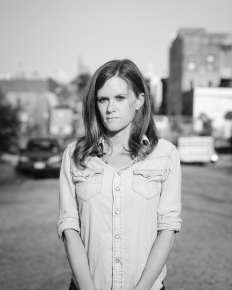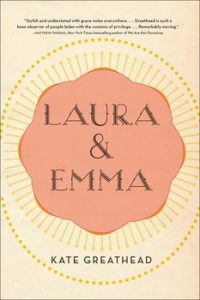Q&A With Novelist Kate Greathead ’05 on Writing Laura & Emma


Laura & Emma, the debut novel by Kate Greathead ’05, was reviewed by Wesleyan magazine books editor Laurie Kenney, who wrote: “Nine-time Moth StorySLAM champion Greathead’s debut novel offers an insightful and witty exploration of class, family, and privilege in New York blue-blood society in the 1980s and early ’90s, as told through the eyes of Laura, an Upper East Side single mother born into wealth, and her daughter, Emma, conceived during a one-night stand. Filled with an eclectic cast of supporting characters and told in vignettes that span more than a decade, Laura & Emma offers a fresh take on the mother-daughter bond and the struggles of trying to find oneself. Booklist says, ‘Greathead’s smart and original take on the mother-daughter novel impresses and charms.'”
In a follow-up conversation with the Connection, Greathead reflected on the writing process, including her work with Wesleyan mentors, and offered advice for those still working toward publication.
Q: How did your work at Wesleyan influence this book? Any great writing advice you received?
A: I wasn’t a confident person when I arrived at Wesleyan. I had some very kind and generous professors—Anne Greene, Phyllis Rose, Roxana Robinson—who helped me develop confidence in my writing, which made me take myself more seriously as a student and a person. One of my most valuable writing experiences was writing my senior thesis, a collection of personal essays, under the guidance of Elizabeth Bobrick [then a visiting professor in English]. Every two weeks we’d meet and discuss my work. The craft of writing can be taught, but of equal importance, the substance of what you write, can’t unless the teacher tries to get to know you. The best teachers find gentle ways to push you towards your most fertile material. Elizabeth took the time to do that and I benefited greatly.
Q: Any significant discoveries you made as you wrote about mother/daughter relationships?
A: I can’t speak for all mother/daughter relationships but I suspect in most there’s a volatility that’s just as intense as a romantic one, an undercurrent of jealousy, resentment, hurt, contempt, and neediness complicating the love. It might rarely erupt, but it’s there, simmering beneath the surface.
In writing Laura & Emma, I became aware of how much my own mother’s approval means to me. She would have had reasons to be less than thrilled with the book and I was lucky that she only had complimentary things to say about it. I should have been satisfied with her reaction, but it wasn’t enough—I wanted her to say it was the best book she’d ever read, declare me her favorite author of all time, etc. It’s never enough. . . .
Q: What was most difficult in the writing of this . . . (and/or the most joyful part)?
A: I wrote about the world of my childhood, Manhattan’s Upper East Side. The UES is an embarrassing place to have grown up. At Wesleyan and throughout my 20s, I used to take great pains to avoid telling people where I was from, sometimes lying and claiming I’d grown up in Harlem (our apartment was technically on the border). In some ways, this book was an exercise in confronting the shame of being associated with this world of inherited wealth and privilege and everything that is wrong and unfair about America.
 Q: What have you found out about your book as you talk with readers?
Q: What have you found out about your book as you talk with readers?
A: People either love or hate the ending. Unfortunately, maybe more the latter.
Q: Any advice you give to writers—or any advice particular to Wesleyan writers that you could offer?
A: When I was a student at Wesleyan I remember—not without cringing—standing in a circle of aspiring writers toasting each other, “Here’s to publishing our first novels by 25!” When I was 25, I hadn’t even managed to publish a short story. And thank God, because it would’ve been terrible. I think when you’re younger you’re inclined to write about yourself in a way that privileges the “sexy“ over the “complicated-and-more-interesting.” Apart from just accumulating experiences, the more life under your belt, the more nuanced and humbled your perspective will be.
My advice: Be suspicious of anything you write that features a romanticized version of your life. Get comfortable mining the bowels of your psyche. Write as much as your life allows, nurture your writerly ambition, but don’t rush—not everyone gets to be a prodigy, and that may not ultimately be a good fate either. Allow yourself the time to experience life and you will develop a more mature perspective that will serve your work. That said, eventually, you do need to muster the courage to send your work out into the world, which is daunting, because rejection is inevitable. Be patient when it comes to publishing.

